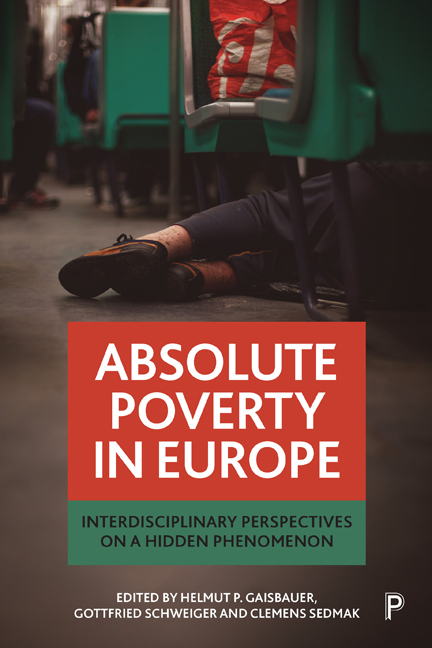Book contents
- Frontmatter
- Contents
- List of figures and tables
- Notes on contributors
- 1 Absolute poverty in Europe: introduction
- Part One Conceptual and methodological challenges
- Part Two Key issues for the absolute poor
- Part Three Policy responses to absolute poverty in Europe
- Part Four Ethical perspectives on absolute poverty in Europe
- Conclusion responding to the dark reality of absolute poverty in European welfare states
- Index
Conclusion responding to the dark reality of absolute poverty in European welfare states
Published online by Cambridge University Press: 27 April 2022
- Frontmatter
- Contents
- List of figures and tables
- Notes on contributors
- 1 Absolute poverty in Europe: introduction
- Part One Conceptual and methodological challenges
- Part Two Key issues for the absolute poor
- Part Three Policy responses to absolute poverty in Europe
- Part Four Ethical perspectives on absolute poverty in Europe
- Conclusion responding to the dark reality of absolute poverty in European welfare states
- Index
Summary
The dark reality of absolute poverty in European welfare states
Poverty is a ‘thick’ and contested concept (Neuhäuser, 2016). Broader concepts and meanings of poverty are closely related to academic or research definitions and to the respective measures of poverty applied in research and social statistics. Thus methodological decisions on the metrics, for example, can have an ample influence on how we generally perceive, morally value and politically tackle poverty (Lister, 2004). Consequently the academic and policy discourses within and across political entities in the field of poverty and poverty relief can take paradigmatic form (Rank, 2017). One of this volume's background assumptions is that the European academic and policy paradigm on poverty (and social exclusion) in the last three or four decades evolved towards the societal middle at the same time as withdrawing from the cankerous margins of society. This alleged shift led to a hegemonic paradigm that could be termed the ‘European relative poverty paradigm’. The following four claims will underpin this argument.
The first claim concerns the core definition of poverty. The concept of relative poverty that lies at the core of this paradigm is rooted in the seminal definition established and popularised so forcefully by Peter Townsend. It defines poverty not as having too little to survive but as having too little to lead a dignified life in a given society according to prevailing living standards (Townsend, 1979). Its conceptualisation constituted a paradigmatic difference to ‘incumbent’ concepts and meanings of absolute poverty, a process that started in the United Kingdom in the 1960s (Torp, 2012). The perspective shifts from the poor state of an individual at the margins of the industrial society to a perspective based on the ‘normal’ or ‘customary’ way of living in any given society. By reflecting on the various dimensions of standards of living the concept opens the door for substantial structural explanations of the causes of poverty instead of purely or mainly individualistic ones (van Oorschot and Halman, 2000). Rooted in the British poverty debate, the concept of relative poverty also took centre stage as a key concept of the EC poverty debate that started in the mid-1970s (Bauer, 2002).
- Type
- Chapter
- Information
- Absolute Poverty in EuropeInterdisciplinary Perspectives on a Hidden Phenomenon, pp. 397 - 410Publisher: Bristol University PressPrint publication year: 2019



